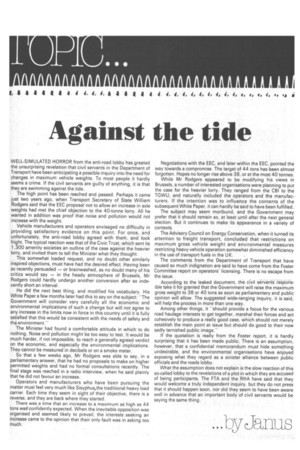Against the tide
Page 72

If you've noticed an error in this article please click here to report it so we can fix it.
WELL-SIMULATED HORROR from the anti-road lobby has greeted the unsurprising revelation that civil servants in the Department of Transport have been anticipating a possible inquiry into the need for changes in maximum vehicle weights. To most people it hardly seems a crime. If the civil servants are guilty of anything, it is that they are swimming against the tide.
The high point has been reached and passed. Perhaps it came just two years ago, when Transport Secretary of State William Rodgers said that the EEC proposal not to allow an increase in axle weights had met the chief objection to the 40-tonne lorry. All he wanted in addition was proof that noise and pollution would not increase with the weight.
Vehicle manufacturers and operators envisaged no difficulty in providing satisfactory evidence on this point. For once, and unfortunately, the anti-road lobby agreed with them, and took fright. The typical reaction was that of the Civic Trust, which sent its 1,300 amenity societies an outline of the case against the heavier lorry, and invited them to tell the Minister what they thought.
This somewhat loaded request, and no doubt other similarly inspired objections, must have had the desired effect. Having been so recently persuaded — or brainwashed, as no doubt many of his critics would say — in the heady atmosphere of Brussels, Mr Rodgers could hardly undergo another conversion after so indecently short an interval.
He did the next best thing, and modified his vocabulary. His White Paper a few months later had this to say on the subject: "The Government will consider very carefully all the economic and environmental implications of such a change but will not agree to any increase in the limits now in force in this country until it is fully satisfied that this would be consistent with the needs of safety and the environment.
The Minister had found a comfortable attitude in which to do nothing. Noise and pollution might be too easy to test. It would be much harder, if not impossible, to reach a generally agreed verdict on the economic, and especially the environmental implications. They cannot be measured in decibels or on a smoke meter.
So that a few weeks ago, Mr Rodgers was able to say, in a parliamentary answer, that he had no proposals to make on higher permitted weights and had no formal consultations recently. The final stage was reached in a radio interview, when he said plainly that he did not favour an increase.
Operators and manufacturers who have been pursuing the matter must feel very much like Sisyphus,the traditional heavy load carrier. Each time they seem in sight of their objective, there is a reverse, and they are back where they started.
There was a time that an increase to a maximum as high as 44 tons wag confidently expected. When the inevitable opposition was organised and seemed likely to prevail, the interests seeking an increase came to the opinion that their only fault was in asking too much. Negotiations with the EEC, and later within the EEC, pointed the way towards a compromise. The target of 44 tons has been almost forgotten. Hopes no longer rise above 38, or at the most 40 tonnes.
While Mr Rodgers appeared to be modifying his views in Brussels, a number of interested organisations were planning to put the case for the heavier lorry. They ranged from the CBI to the TGWU, and naturally included the operators and the manufacturers. If the intention was to influence the contents of the subsequent White Paper, it can hardly be said to have been fulfilled.
The subject may seem moribund, and the Government may prefer that it should remain so, at least until after the next general election. But it continues to make its appearance in a variety of contexts.
The Advisory Council on Energy Conservation, when it turned its attention to freight transport, concluded that restrictions on maximum gross vehicle weight and environmental measures restricting heavy vehicle operation somewhat diminished efficiency in the use of transport fuels in the UK.
The comments from the Department of Transport that have caused so much indignation are said to have come from the Foster Committee report on operators' licensing. There is no escape from the issue.. According to the leaked document, the civil servants responsible take it for granted that the Government will raise the maximum gross weight to 38 or 40 tons as soon as parliamentary and public opinion will allow. The suggested wide-ranging inquiry, it is said, will help the process in more than one way.
Among other things, it -should provide a focus for the various road haulage interests to get together, marshal their forces and act cohesively to produce a really good case, which should not merely establish the main point at issue but should do good to their now sadly tarnished public image."
If the quotation is really from the Foster report, it is hardly surprising that it has been made public. There is an assumption, however, that a confidential memorandum must hide something undesirable, and the environmental organisations have enjoyed exposing what they regard as a sinister alliance between public officials and the roads lobby.
What the assumption does not explain is the slow reaction of this so-called lobby to the revelations of a plot in which they are accused of being participants. The FTA and the RHA have said that they would welcome a truly independent inquiry, but they do not press that it should happen soon, nor did they seem to have been aware well in advance that an important body of civil servants would be saying the same thing.
• • • by Ja 1U S


































































































































